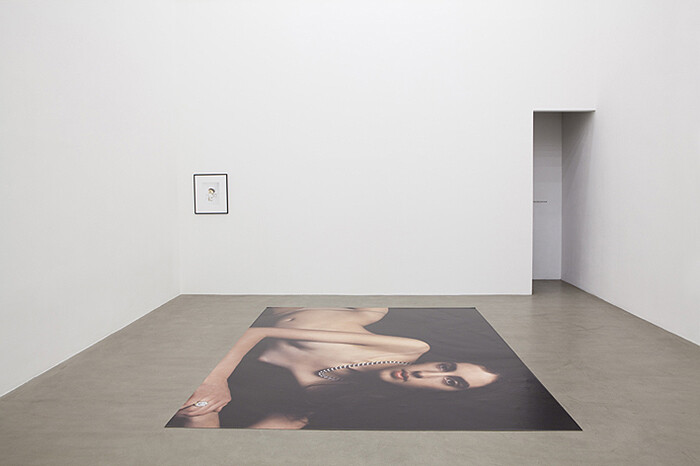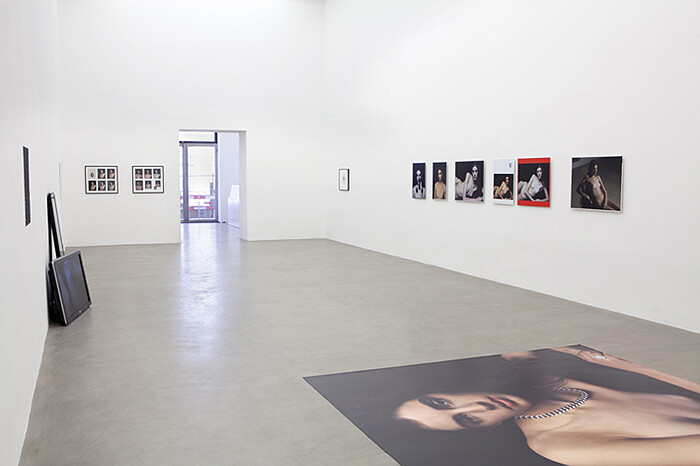“The image is one thing the man is another, sure I’m a shy country boy,” Elvis Presley once quipped at a press conference before standing up grinning to reveal a glittering diamond studded belt buckle to a fawning media assemblage. Before there was bling there was the King, and the cultish glamour industry he propelled.
When entering the soaring space of Galerie Meyer Kainer to view Bernadette Corporation’s (BC) “Stone Soup” one encounters a monolithic fashion ‘advertisement’ in the style of Calvin Klein or Bulgari. It’s the set piece for a pseudo ad campaign for a real luxury jeweler (Judith Ripka) shot for BC by photographer Alex Antitch. Equal parts totemic minimalist jibe and talismanic icon, the crumply John McCracken style obelisk towers nearly four meters high in the gallery. Wrapped and bound by rope around metal scaffolding, a photo image of a nubile model is printed on its glossy billboard vinyl, her vacant face bejeweled with oval shaped diamond earrings.
In the long rectangular main gallery are a series of framed inkjet and c-prints, stock model calling cards and prints mounted on aluminum that have the sleek stretch limo glamour of a fashion editorial. Some of these professionally retouched photos hang next to the amateur versions produced by the less steady hand of BC. A big vinyl ad-banner lies on the floor, the lithesome doe-eyed professional model epitomizing a kind of airbrushed bodily perfection. Just north of drinking age she nakedly poses on a neutral backdrop. Instead of the haute fashion of the moment she wears jewelry upon her supple flesh and the lusty gaze of ennui. Her seductive stare is haughty and vacuous, as if seeing through your objectification and lust for her elusive form. A queer feeling comes over you as you faintly discern differences between BC’s botched retouching and the professional manipulations that equate to virtual plastic surgery done in service to the glamour industry.
Amidst the slick photos hang low-fi scanned potato prints and photos of potatoes engraved with the BC logo. Given the same stylistic photography studio set-up treatment as the sinuous model, they cite Christopher Williams, Roe Ethridge, Elad Lassry, and Annette Kelm et al. Such reductive impressions contrasted with sophisticated digital enhancements are underscored by two pixilated low-resolution videos on flat panel monitors showing footage of British teenagers indulging in the late 1990s – 2000s pastime of “Happy Slapping.” Using mobile phones to record the thuggish slapping, punching, or kicking of innocent passerbys, these brief, instant movies are immediately downloaded, forwarded and circulated amongst circles of friends.
An early “noughties” equivalent of NYC’s “wilding” rampages of the 1980s where gangs of youth randomly attacked strangers, the “Happy Slapping” episodes are ready-made reality-television. These ad hoc video’s echo Maja Bajevic’s antagonistic face slapping video, How do you want to be governed (2009) and Terence Koh/Banks Violette’s collaborative video, untitled (enter fear light / I may not climb the social ladder (but I can jump the schoolyard fence) (2006).
With their mid-90’s roots in downtown New York D.I.Y. fashion and publishing, Bernadette Corporation has a handle on its many personifications of social media context, appropriation, image control, and authorship. BC dastardly epitomizes the symbiosis of fashion and art, deceptively critiquing it while profiting from its aesthetic pull. Tangentially a virtual and analog cousin to Parreno and Huyghe’s recycled and inanimate AnnLee, their collectivist production uses bait and switch strategies. As the typographical persona of a disembodied poet-maudit, BC is the acronym of a ‘corporate’ logo, a generic offshore artist with connotations far and wide. BC connotes archaic history of before Christ, fashion branding as in the inverted bisecting monogram of Coco Chanel, and the viral “blind” carbon copy (bcc) of electronic mail.
Bernadette Corporation knows its market share and cannibalizes its iconographies while having their cake and eating it too. They psychologically understand myth making and the cold faceless corporate dystopia as seen in the James Caan film Rollerball (1975) that frowned upon individualism. Playing the algorithmic hand of a digitized circulatory system of virtually enhanced reality where file sharing and consumption feed off of each other in an endless loop, they are Delphic editors of empty signifiers. We think we are individuals yet one look at mainstream conformity tells you the world is a victim of branding that would make Edward Bernays proud.
“Stone Soup” is a ciphered recipe correlating its parable into measurements of unquantifiable desire; the innocence of childhood turns into rebellious teens, then young consumerist adulthood with its trendy lifestyle message slogans. Today’s geopolitics points toward the suicide endgame of our deluded credit crunching, post-G20 carbon trading smoke and mirror consumer economies. Clinically self-replicating the banalities of real life and the prismatic bounce back from reality television, BC navigates the polestar of globalization that is really a wobbly side effect of mass privatization. In the subversive brine formulae of “Stone Soup,” Bernadette Corporation paradoxically cooks up an agnostic yet decadent broth.







